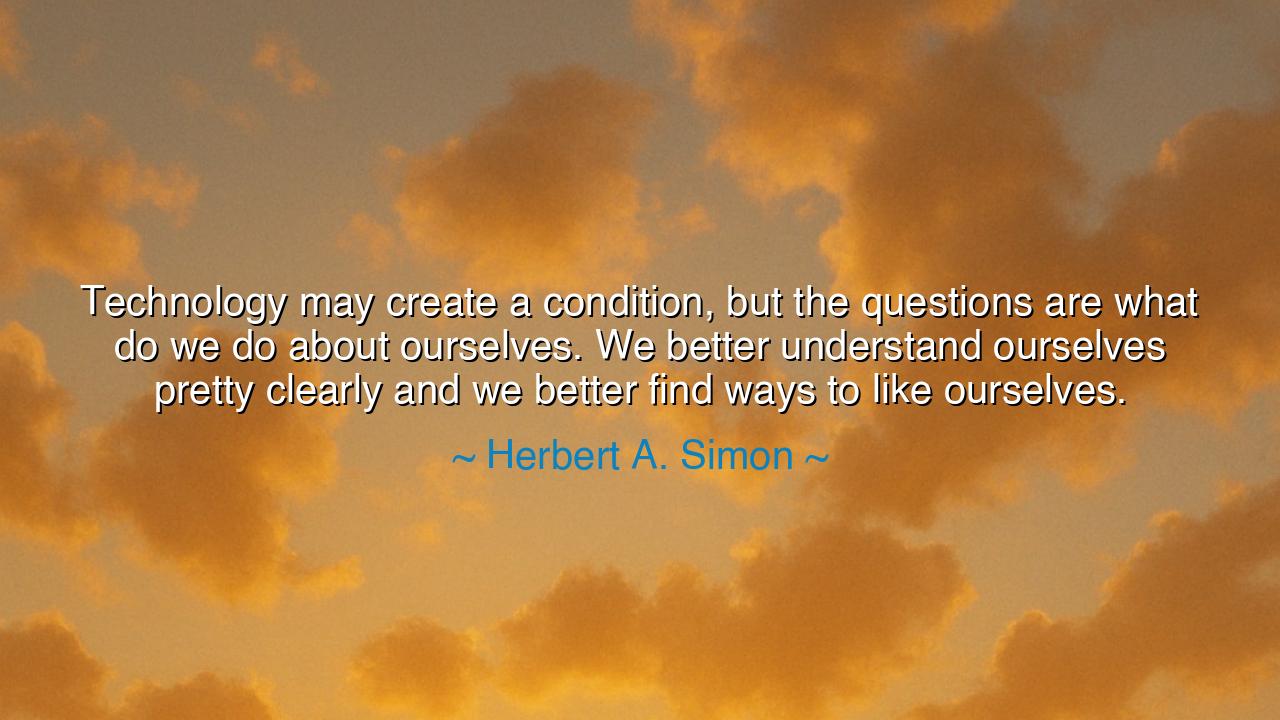
Technology may create a condition, but the questions are what do
Technology may create a condition, but the questions are what do we do about ourselves. We better understand ourselves pretty clearly and we better find ways to like ourselves.






Hear the wisdom of Herbert A. Simon, Nobel laureate, thinker, and teacher of men, who looked deeply into the relationship between mankind and its creations, and declared: “Technology may create a condition, but the questions are what do we do about ourselves. We better understand ourselves pretty clearly and we better find ways to like ourselves.” These are not casual musings, but a stern reminder that though the world builds machines of iron and circuits of fire, it is still the human spirit that determines whether such inventions bring freedom or ruin.
The origin of this saying lies in Simon’s study of human decision-making, artificial intelligence, and the complexity of systems. He saw, long before others, that technology is not merely a tool but a force that shapes the conditions of human life—changing how we work, how we speak, how we see the world. Yet he warned: these conditions do not absolve us of responsibility. Machines may alter our environment, but they do not decide how we treat one another, nor do they instruct us how to live with meaning. That burden rests always upon the soul.
Consider the tale of Oppenheimer and the dawn of the atomic age. Science created the condition: the splitting of the atom, the harnessing of power greater than any man had known. But the question was not whether the bomb could exist, but what humanity would do with it. The invention was neutral; the decisions were human. Some used it to end a war, others feared it would end civilization itself. Simon’s words echo in this tale: the condition is made by technology, but the moral weight remains on us—to understand ourselves and to guide our choices with wisdom.
So too in the rise of the internet. It created a condition where voices could travel across the globe in an instant, where knowledge could be shared by kings and peasants alike. Yet what have we done with it? At times, we have used it to enlighten, to connect, to heal divisions. At other times, it has become a snare of hatred, falsehood, and division. The net itself is neither angel nor demon; it is our selves, our insecurities, our vanities, our yearnings, that shape its fruit. Simon’s command is clear: before we master machines, we must learn to master ourselves.
The heart of his wisdom is in these words: “We better find ways to like ourselves.” For many of the world’s troubles spring not from the machines in our hands but from the turmoil in our hearts. If we despise ourselves, we will use technology to wound others. If we envy, we will use it to boast and destroy. If we fear, we will use it to control and oppress. But if we learn to accept, to understand, and to cherish our own humanity, then our tools become extensions of compassion and creativity rather than weapons of destruction.
Thus, the lesson is plain: do not place your hope in machines to save you, nor your blame on them when things go wrong. Look instead to your own soul. Ask: do I act out of love, or out of fear? Do I use my tools to build, or to break? Do I understand myself enough to know my weaknesses, and do I strengthen them with patience and humility? For Simon’s wisdom reminds us that the greatest frontier is not in silicon or steel, but in the human heart.
So I say to you, children of tomorrow: embrace technology, but never forget yourself. Cultivate self-knowledge as diligently as you cultivate skill. Practice self-respect as carefully as you practice science. And when you hold in your hand the newest invention, remember Simon’s words: the condition may be shaped by machines, but the outcome is shaped by men. If you love yourself truly, you will love others wisely, and then every tool, however great, will serve not destruction but life. For the future is not in the machine—it is in the soul that wields it.






AAdministratorAdministrator
Welcome, honored guests. Please leave a comment, we will respond soon